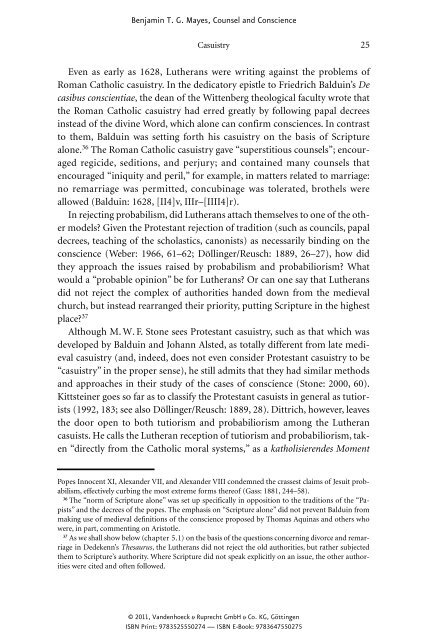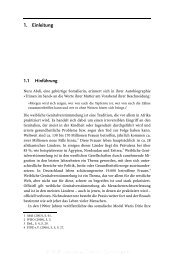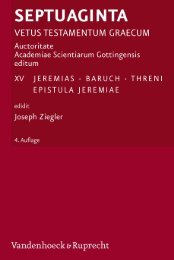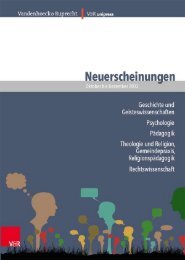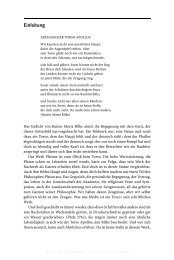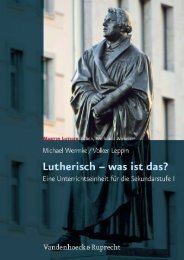Counsel and Conscience
Counsel and Conscience
Counsel and Conscience
Create successful ePaper yourself
Turn your PDF publications into a flip-book with our unique Google optimized e-Paper software.
Benjamin T. G. Mayes, <strong>Counsel</strong> <strong>and</strong> <strong>Conscience</strong><br />
Casuistry 25<br />
Even as early as 1628, Lutherans were writing against the problems of<br />
Roman Catholic casuistry. In the dedicatory epistle to Friedrich Balduin’s De<br />
casibus conscientiae, the dean of the Wittenberg theological faculty wrote that<br />
the Roman Catholic casuistry had erred greatly by following papal decrees<br />
instead of the divine Word, which alone can confirm consciences. In contrast<br />
to them, Balduin was setting forth his casuistry on the basis of Scripture<br />
alone. 36 The Roman Catholic casuistry gave “superstitious counsels”; encouraged<br />
regicide, seditions, <strong>and</strong> perjury; <strong>and</strong> contained many counsels that<br />
encouraged “iniquity <strong>and</strong> peril,” for example, in matters related to marriage:<br />
no remarriage was permitted, concubinage was tolerated, brothels were<br />
allowed (Balduin: 1628, [II4]v, IIIr–[IIII4]r).<br />
In rejecting probabilism, did Lutherans attach themselves to one of the other<br />
models? Given the Protestant rejection of tradition (such as councils, papal<br />
decrees, teaching of the scholastics, canonists) as necessarily binding on the<br />
conscience (Weber: 1966, 61–62; Döllinger/Reusch: 1889, 26–27), how did<br />
they approach the issues raised by probabilism <strong>and</strong> probabiliorism? What<br />
would a “probable opinion” be for Lutherans? Or can one say that Lutherans<br />
did not reject the complex of authorities h<strong>and</strong>ed down from the medieval<br />
church, but instead rearranged their priority, putting Scripture in the highest<br />
place? 37<br />
Although M. W. F. Stone sees Protestant casuistry, such as that which was<br />
developed by Balduin <strong>and</strong> Johann Alsted, as totally different from late medieval<br />
casuistry (<strong>and</strong>, indeed, does not even consider Protestant casuistry to be<br />
“casuistry” in the proper sense), he still admits that they had similar methods<br />
<strong>and</strong> approaches in their study of the cases of conscience (Stone: 2000, 60).<br />
Kittsteiner goes so far as to classify the Protestant casuists in general as tutiorists<br />
(1992, 183; see also Döllinger/Reusch: 1889, 28). Dittrich, however, leaves<br />
the door open to both tutiorism <strong>and</strong> probabiliorism among the Lutheran<br />
casuists. He calls the Lutheran reception of tutiorism <strong>and</strong> probabiliorism, taken<br />
“directly from the Catholic moral systems,” as a katholisierendes Moment<br />
Popes Innocent XI, Alex<strong>and</strong>er VII, <strong>and</strong> Alex<strong>and</strong>er VIII condemned the crassest claims of Jesuit probabilism,<br />
effectively curbing the most extreme forms thereof (Gass: 1881, 244–58).<br />
�� The “norm of Scripture alone” was set up specifically in opposition to the traditions of the “Papists”<br />
<strong>and</strong> the decrees of the popes. The emphasis on “Scripture alone” did not prevent Balduin from<br />
making use of medieval definitions of the conscience proposed by Thomas Aquinas <strong>and</strong> others who<br />
were, in part, commenting on Aristotle.<br />
�� As we shall show below ( chapter 5.1)<br />
on the basis of the questions concerning divorce <strong>and</strong> remarriage<br />
in Dedekenn’s Thesaurus, the Lutherans did not reject the old authorities, but rather subjected<br />
them to Scripture’s authority. Where Scripture did not speak explicitly on an issue, the other authorities<br />
were cited <strong>and</strong> often followed.<br />
© 2011, V<strong>and</strong>enhoeck & Ruprecht GmbH & Co. KG, Göttingen<br />
ISBN Print: 9783525550274 — ISBN E-Book: 9783647550275


